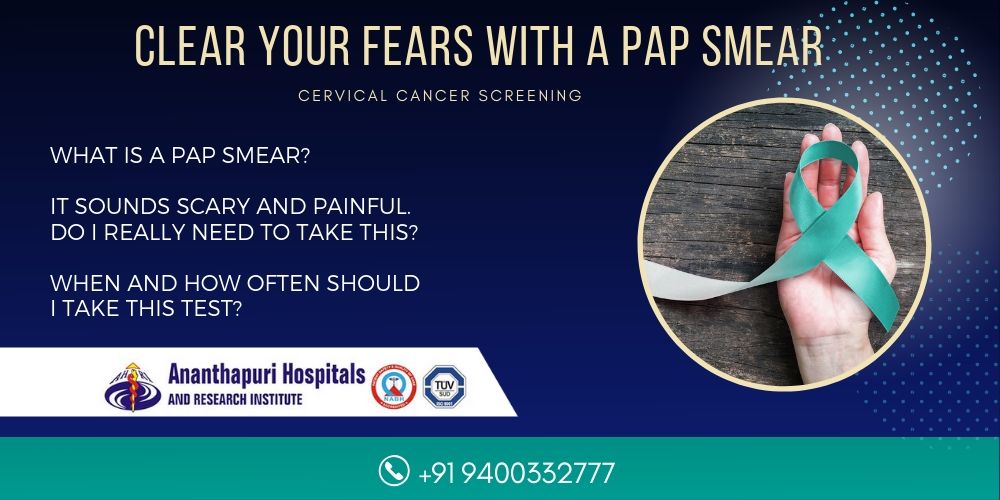- 23/July/2019

Clear Your Fears With A Pap Smear - Ananthapuri Hospitals
Cervical cancer is the second most common cancer among women worldwide and one out of every five women in the world suffering from this disease belongs to India. More than three-fourths of these patients are diagnosed at advanced stages leading to a poor prospect of survival and cure.
What if we told you that most of those cases progressed until this stage due to lack of awareness of the preventive measures?
Cervical Cancer can be prevented by screening women systematically through organised population-based programmes to detect the disease at the precancer stage when it is amenable to simple treatment and cure. These population-based cervical screenings use pap smear cytology - an internationally accepted screening method for cervical premalignant and malignant conditions. It is offered to all individuals in a target group, usually defined by age, as part of an organised program. Since the introduction of population-based programmes, the yearly occurrence and death rates from this cancer have gone down by 50-70% in many developed countries.
This article explains what a pap smear is and the reasons why you need to let go of any fear surrounding it!
- WHAT IS A PAP SMEAR?
A Pap smear is a method of cervical screening used to detect precancerous or cancerous cells of the cervix. In this procedure, the doctor uses a speculum to separate the vaginal wall and inserts a wooden spatula or brush to take a quick scratch from the cervix.
The cell samples are then sent to a pathology lab, where they are tested for abnormal cervical cell changes. If any abnormalities are found, a colposcopy or a biopsy may be done to test whether the precancerous or cancerous cells found in the cervix are caused by HPV or Human Papillomavirus (contracted after sexual intercourse) or any other factors.
If a precancerous cell is left untreated for the next 10-13 years, it will become cancerous. Therefore, any abnormal results will be followed up by further tests or interventions that aim to prevent it from progressing to cervical cancer.
- IT SOUNDS SCARY AND PAINFUL. DO I REALLY NEED TO TAKE THIS?
Having cervical screening lowers your chances of getting cervical cancer.
While some women avoid taking pap smears out of fear of pain, some others avoid it out of fear of hearing something scary. If you belong to either of these categories, here are two things you should know:
- A Pap smear is a quick and painless procedure that only takes 2-3 minutes to complete. IT IS NOT PAINFUL AT ALL!
- Out of 100 women who have cervical screening, about 94 will have a normal result. If you have a normal result, you have a very low risk of developing cervical cancer before your next screening test.
- Out of 100 women who have cervical screening, about 6 will have abnormal cells in their sample. Abnormal cells are not cancer, but sometimes they can develop into cancer if they are left untreated.
- Out of 1000 women who have cervical screening, only 1 will have possible cancer cells in their sample. If you have this result, you will be asked to see a specialist as soon as possible.
So go for it without any fear!
- I AM CONVINCED. WHEN AND HOW OFTEN SHOULD I TAKE THIS TEST?
Ideally, you need to take the first test at age 25 or once you become sexually active. Continue taking it every 3-5 years until you turn 50. From 50 years onwards, take the test every 5 years until 65.
Girls aged 12 to 13 are now offered vaccination to protect them against the types of HPV that cause cervical cancer.
- WHAT ARE THE SYMPTOMS OF CERVICAL CANCER?
Cancer can develop between your regular screening tests. So it is important to look out for anything that is unusual for you, especially the following:
- Bleeding between your periods, after sex, or after menopause
- Vaginal discharge
- Pain or discomfort during sex
If you have any of these symptoms, see a doctor as soon as possible without waiting for your next cervical screening appointment. Usually, these symptoms won’t mean you have cancer, but if you are found to have cancer, getting it diagnosed and treated early can mean you are more likely to survive.
- WHO ARE MORE LIKELY TO BE AFFECTED BY CERVICAL CANCER?
Almost all cases of cervical cancer are caused by HPV infections. HPV is found on the skin around the whole genital area and can be spread through any type of sexual activity, which means that condoms do not always protect you from getting an HPV infection.
HPV infections are more likely to affect you if you:
- Have had many sexual partners
- Are a smoker (Smoking makes it harder for your body to get rid of HPV infections)
Looking to get a cervical cancer screening for yourself?
Ananthapuri Hospitals has an excellent team of gynaecologists who offer dedicated care with comprehensive diagnostic services and treatment facilities for women. To book an appointment, call us at +919400332777 or visit our hospital at Chacka, NH Bypass, Thiruvananthapuram.
- tags
- PAP SMEAR
- cervical cancer

